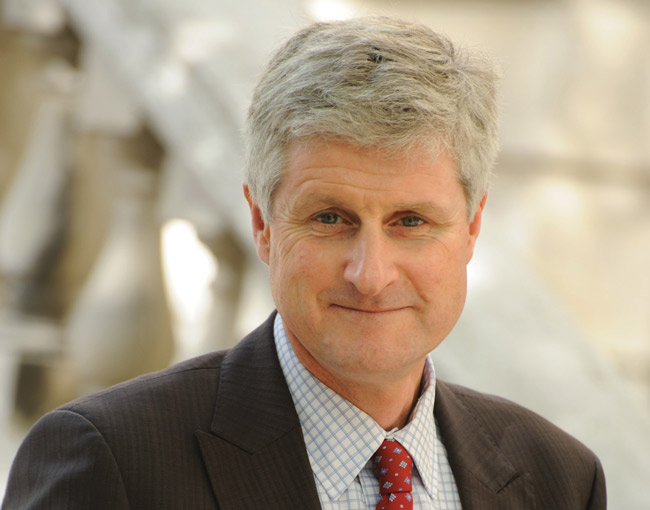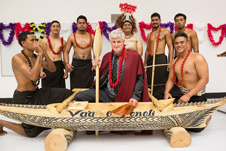Monday 16 July 2018 7:13pm
Professor Peter Crampton has stepped down from his role as Pro-Vice-Chancellor of the Division of Health Sciences and into a new role at Kōhatu, the Centre for Hauora Māori. The Otago Bulletin Board visited him during his last week as PVC, late last month.

Professor Peter Crampton is grateful for the opportunities he has had during his seven-and-a-half years as Pro-Vice-Chancellor of the Division of Health Sciences.
Professor Peter Crampton apologises for the fact his office looks “a little forlorn”. Half-packed boxes, piles of books, and even a pacific garland are accumulating in piles as he gets ready to move out of the space he has worked in for the past seven-and-a-half years as Pro-Vice-Chancellor of the Division of Health Sciences and Dean of the Otago Medical School.
“The funny thing is that I clearly remember coming in with boxes one weekend just before I started in the role,” he says.
Professor Crampton moved from Wellington with his wife and three children (then aged nine, 11 and 13) to take up the key University positions in January 2011 – stepping up from his previous role as Dean of the University of Otago, Wellington.
"Much of the satisfaction I have gained from my role has been vicarious; being a spectator and hopefully a facilitator, in a small way of other people’s successes."
Seven-and-a-half years on and two of his children are studying at Otago - though neither in Health Sciences – while the third is in his penultimate year of secondary school.
He says the move was wonderful for his family, and incredibly fulfilling for him professionally.
“Dunedin is a wonderful place to have a family,” he says. “I truly mean that; it’s very heartfelt. I’ve got to know the area quite well now, and the physical beauty of this part of the world is just exceptional.”
In his time at the helm the Division of Health Sciences has prospered. The achievements are many and wide reaching; tangible and intangible; structural, cultural and potentially world-changing.
But Professor Crampton does not claim credit.
“I have loved the collective achievements,” he says. “Much of the satisfaction I have gained from my role has been vicarious; being a spectator and hopefully a facilitator, in a small way of other people’s successes.”
These successes include getting the Dental and Research Support Facility buildings out of the ground; contributing to the establishment of the Te Kāika initiative in Caversham; the large increase in Māori and Pacific student numbers, as well as a strong outreach into the Pacific; and overseeing the cutting-edge research happening across the Division.
"I’m amazed we’ve been able to change the narrative and reality so completely in such a short space of time. Full credit to the University’s Māori and Pacific leadership."
“The groups have achieved so much over the time,” he says. “Being able to witness and facilitate these successes has been hugely enjoyable.
“I love that we have world leading scientists coming out of our ears and changing the world using science.
“You can wander into any building here, in Christchurch or Wellington and get talking to people who are passionate and driven, doing extraordinary research. I mean jaw dropping work.
“My role has been to facilitate and resource that.”
He says the Māori and Pacific achievements within the Division are a particular point of pride.
Between 2010 and 2016, there was a 124 per cent increase in the number of Māori students and 121 per cent increase in Pacific students in health professional programmes, more pronounced in medicine and dentistry (increases of 179 and 133 per cent respectively).
“I’m amazed we’ve been able to change the narrative and reality so completely in such a short space of time,” he says. “Full credit to the University’s Māori and Pacific leadership. My role has just been part of a complex jigsaw.”
That may be so – but the Māori and Pacific leadership within the University and beyond have both been keen to acknowledge and celebrate Professor Crampton’s contributions.

Professor Peter Crampton with a traditional va’a (waka) presented to him in appreciation by the Pacific community earlier this year. Photo: Sharron Bennett.
Earlier this year, the Pacific community presented him with a traditional va’a (waka), symbolising the Pacific journey he has enabled in the Division of Health Sciences. A team of three traditional master carvers from Samoa was brought to Dunedin for three weeks by Va’a o Tautai to build a double hulled waka. One was presented to Professor Crampton and his family, while the other remains at the University’s Va’a o Tautai offices.
A few weeks ago staff in Kōhatu, the Centre for Hauora Māori, held a celebratory gathering for Professor Crampton to thank him for supporting the work of the Centre and for actively promoting Māori development in the University. Tuari Potiki, Director of the Office of Māori Development, added his personal words of thanks at the Vice-Chancellor’s event in the Council Chambers.
Professor Crampton says he is grateful for all of the opportunities that have come with the role – and to all of the staff he has worked with in the Division, and the Divisional Office.
He believes the language of the University – which labels staff as Academic or Professional – can sometimes get in the way and inhibit teamwork.
"In the Health Sciences Divisional Office we have taken more of a whānau approach – we have been a very close team working towards objectives together. We have supported each other through thick and thin, and over the last seven-and-a-half years this has been a wonderful team to work with."
“In the Health Sciences Divisional Office we have taken more of a whānau approach – we have been a very close team working towards objectives together.
“We have supported each other through thick and thin, and over the last seven-and-a-half years this has been a wonderful team to work with.”
Just three weeks into his new role in 2011 the Christchurch earthquake struck. The tremors were felt in the Dunedin office – “we were in a meeting, and we were at the point of leaving the building” – and had an immediate and deep impact on the Division.
“The earthquakes accelerated the process of team building in the Divisional Office, and of course necessitated a very long process of recovery, planning and repair at the University of Otago Christchurch campus,” he says.
His thanks to all he has worked with travel across the University, health sector and country.
“Thank you to the Deans, Associate Deans and 41 Heads of Department, to our amazing academic staff and professional staff. Thanks to the literally hundreds and hundreds of colleagues and friends in the health system – in health centre, physiotherapy clinics, general practices, pharmacies, dental clinics, hospitals and so on – outside the university, on whom we are completely dependent to run our nine health professional programmes. Thank you to the Vice-Chancellor and senior colleagues for the opportunities I have had and for the pleasure of working with them.”
Since his Otago Bulletin Board interview, Professor Crampton has begun in a new role at Otago – based in Kōhatu, the Centre for Hauora Māori. He will be teaching and researching – particularly in matters related to health policy, Māori health and Pacific health.
"Just love the role as much as I have."
He also continues as Dean of the Medical School while the University works through the process of appointing his successor in that role.
He is looking forward to more family time, and to being able to achieve some of the personal goals he put on hold as the demands of the PVC role filled his time – such as improving his conversational Māori.
Professor Crampton has passed the Pro-Vice-Chancellor baton on to Professor Paul Brunton, the former Dean of the Dental School – and says he is delighted the Division will be in such excellent hands.
His advice is simple: “Just love the role as much as I have.”
